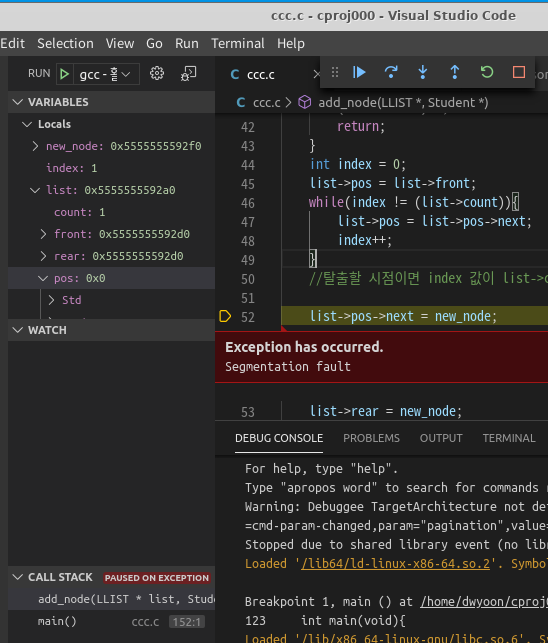segmentation fault의 발생지점을 찾고있습니다.
조회수 2164회
이름과 번호가 부여된 구조체를 각각 배열, Linked-리스트로 만들고 keyword로 검색한 뒤 이름을 검색했으면 번호가, 또는 그 반대결과를 출력하는 것을 목표로 작성했습니다. linux 기반으로 작성하는것이 처음이라 코드 외적인데서 신경을 너무 많이 쓴거같네요.
컴파일 에러는 거의 잡혔는데 제목 그대로 덤프만 발생시키면서 정지되었습니다. 디버깅 툴 사용에 익숙지 않아서 에러메시지도 정확한 의미를 받아들이기가 힘드네요
Program received signal SIGSEGV, Segmentation fault. 0x00010654 in add_node()
이런식으로 나오면 main.c에서 add_node()가 실행되면서 문제가 생긴건가요 아니면 add_node() 함수 자체의 구현에 오류가 있는건가요?
#include <stdio.h>
#include <string.h>
#include <stdlib.h>
typedef struct _Student{
char name[10];
char number[10];
} Student;
typedef struct node{
Student* Std;
struct node* next;
}NODE;
typedef struct{
int count;
NODE* front;
NODE* rear;
NODE* pos;
}LLIST;
LLIST* create_list(){
LLIST* list;
list = (LLIST*)malloc(sizeof(LLIST));
if(list){
list->front = NULL;
list->rear = NULL;
list->count = 0;
}
return list;
}
void add_node(LLIST* list, Student* Std_info) {
NODE* new_node=(NODE*)malloc(sizeof(NODE));
new_node -> Std = Std_info;
new_node -> next = NULL;
if(list -> count == 0){
list->front = new_node;
list->rear = new_node;
(list->count)++;
return;
}
int index = 0;
list->pos = list->front;
while(index != (list->count)){
list->pos = list->pos->next;
index++;
}
//탈출할 시점이면 index 값이 list->count와 같음
list->pos->next = new_node;
list->rear = new_node;
(list->count)++;
return; //void형을 반환할때는 return값이 없어도 오류가 나지 않음.
}
void del_node(LLIST* list){
if(list->count == 1){
free(list->front);
list->front = NULL;
list->rear = NULL;
list->count = 0;
return;
}
int index = 0;
list->pos = list->front;
NODE* bckup = NULL;
while(index != list->count){
bckup = list->pos;
list->pos = list->pos->next;
index++;
}
//탈출할 시점에 index값=list->count 값
list->rear = bckup;
bckup->next = NULL;
free(list->pos);
list->pos=NULL;
(list->count)--;
return;
}
char* finderLLIST(LLIST* list, char* keyword){
if(list->count==0){
keyword = "빈 리스트";
return keyword;
}
int index = 0;
list->pos = list->front; //앞부터 시작
//&&연산자는 앞에서 결과값이 확실해지면 뒤쪽의 항은 계산하지 않는다.
while(index < list->count && strcmp(list->pos->Std->name,keyword) != 0 && strcmp(list->pos->Std->number,keyword) != 0){
list->pos = list->pos->next;
index++;
}
if(index >= list->count){
keyword = "일치없음";
}else if(strcmp(list->pos->Std->name,keyword) == 0){
keyword = list->pos->Std->number;
}else if(strcmp(list->pos->Std->number,keyword) == 0){
keyword = list->pos->Std->name;
}
return keyword;
}
char* finderARR(Student* Std, char* keyword){
int index;
for(index=0; index<=9; index++){
if(strcmp(Std->name,keyword) == 0){
keyword = (Std+index)->number;
return keyword;
}else if(strcmp((Std+index)->number,keyword) == 0){
keyword = (Std+index)->name;
return keyword;
}
}
keyword = "일치없음";
return keyword;
}
int main(void){
Student Std[10]={
{.name = "김김김",.number = "1234123"},
{.name = "님님님",.number = "2222222"},
{.name = "딤딤딤",.number = "3333333"},
{.name = "림림림",.number = "4444444"},
{.name = "밈밈밈",.number = "5555555"},
{.name = "빔빔빔",.number = "6666666"},
{.name = "심심심",.number = "7777777"},
{.name = "임임임",.number = "8888888"},
{.name = "짐짐짐",.number = "9999999"},
{.name = "침침침",.number = "0000000"}
};
int i;
Student Std_list[10] = {
{.name = "김김김",.number = "1234123"},
{.name = "님님님",.number = "2222222"},
{.name = "딤딤딤",.number = "3333333"},
{.name = "림림림",.number = "4444444"},
{.name = "밈밈밈",.number = "5555555"},
{.name = "빔빔빔",.number = "6666666"},
{.name = "심심심",.number = "7777777"},
{.name = "임임임",.number = "8888888"},
{.name = "짐짐짐",.number = "9999999"},
{.name = "침침침",.number = "0000000"}
};
LLIST* list_Std = create_list();
for(i=0; i<10; i++){
add_node(list_Std, &Std_list[i]);
}
//여기까지는 배열과 연결리스트의 선언과 메모리 할당 및 초기화.
char keyword[10];
printf("배열에서 검색: ");
scanf("%s", keyword);
//printf("\n버퍼 확인 ㅁㅁ%sㅁㅁ", keyword);
printf("-->%s \n", finderARR(Std, keyword));
printf("연결리스트에서 검색: ");
scanf("%s", keyword);
//printf("\n버퍼 확인 ㅁㅁ%sㅁㅁ", keyword);
printf("-->%s", finderLLIST(list_Std, keyword));
//여기부터는 배열과 연결리스트의 메모리 할당 해제
for(i=0; i<10; i++){
del_node(list_Std);
}
free(list_Std);
return 0;
}
1 답변
-
https://code.visualstudio.com/docs/cpp/config-linux#_debug-helloworldcpp
vs code 설치하고, 위 링크에서 따라해 가면서 빌드, 디버그 설정하면, 그래도 조금 편하게 vs code 안에서 디버깅 해 볼 수 있는 것 같습니다. 한번 따라서 해보세요.
아래 캡쳐는 우분투에서 설정 따라해서 디버그모드로 돌려서, 예외 발생한 상황입니다.
list->pos값이NULL이네요.


댓글 입력